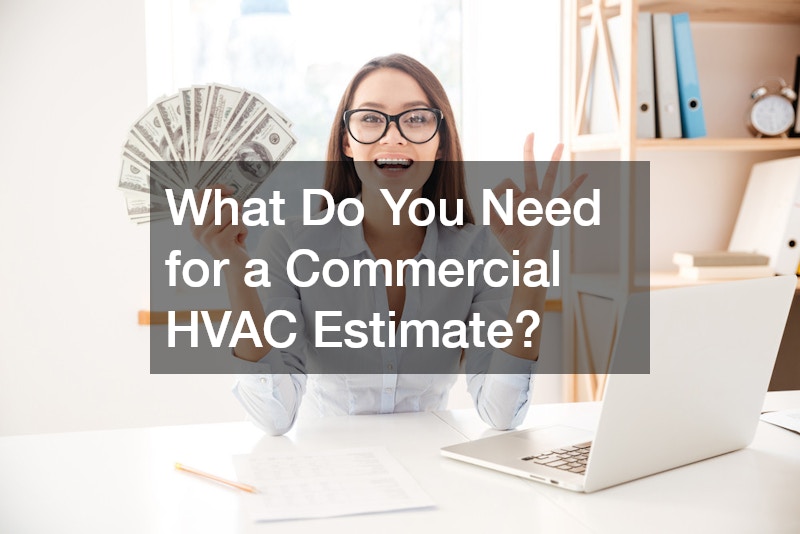Securing a reliable commercial HVAC estimate is essential for any business looking to install, replace, or repair its heating, ventilation, and air conditioning systems. An accurate estimate not only helps in budgeting but also ensures that the project meets the specific needs of the commercial space. Here’s a comprehensive guide on what you need for a commercial HVAC estimate.
Detailed Building Information
The first step in obtaining a commercial HVAC estimate is providing detailed information about the building.
This includes:
Building Size and Layout
The size and layout of the building are critical in determining the type and size of the HVAC system required. HVAC professionals will need the square footage of the building and a detailed floor plan, including the number of floors, rooms, and the purpose of each area. This information helps in calculating the heating and cooling loads.
Existing HVAC System
If there is an existing HVAC system, provide details about its age, make, model, and any known issues. This information helps the HVAC contractor assess whether parts of the existing system can be reused or if a complete replacement is necessary.
Building Usage
Understanding how the building is used is crucial for an accurate estimate. Different areas may have varying heating and cooling needs. For example, server rooms require more cooling than office spaces. Provide details about occupancy patterns, business hours, and any specific requirements for different areas.
Specific HVAC Needs
To get a precise estimate, you must clearly communicate your specific HVAC needs and preferences. This includes:
Type of System
Decide on the type of HVAC system you need. Common options for commercial spaces include rooftop units, split systems, and ductless mini-splits. Your choice will depend on factors such as the building’s design, budget, and specific heating and cooling needs.
Energy Efficiency
Specify your preference for energy-efficient systems. Energy-efficient HVAC systems may have a higher upfront cost but can lead to significant savings in the long run through reduced energy bills. Look for systems with high SEER (Seasonal Energy Efficiency Ratio) and EER (Energy Efficiency Ratio) ratings.
Indoor Air Quality
If indoor air quality is a concern, mention this to the HVAC contractor. Additional features such as air purifiers, humidifiers, and advanced filtration systems can be included in the estimate to ensure a healthier indoor environment.
Compliance with Regulations
Ensure that the HVAC contractor is aware of all relevant building codes and regulations. This includes local, state, and federal guidelines for commercial HVAC systems. Compliance with these regulations is critical for safety, efficiency, and avoiding potential fines.
Zoning and Permits
Some HVAC installations require zoning approval and permits. The HVAC contractor should handle this process, but you may need to provide information about existing zoning classifications and any previous permits obtained for the building.
Environmental Regulations
If your building is subject to specific environmental regulations, such as LEED certification requirements, inform the contractor. This may influence the type of HVAC system and components used to meet sustainability standards.
Contractor Qualifications
Choosing a qualified HVAC contractor is crucial for obtaining a reliable estimate. Ensure that the contractor has the necessary qualifications, including:
Licensing and Insurance
Verify that the HVAC contractor is licensed and insured. Licensing ensures that the contractor has met the required standards for training and experience. Insurance protects you from liability in case of accidents or damage during the installation or repair process.
References and Reviews
Ask for references from previous clients and check online reviews. A reputable contractor should have positive feedback from businesses that have similar HVAC needs.
Experience with Commercial Projects
Ensure that the contractor has experience with commercial HVAC projects. Commercial systems are more complex than residential ones, and an experienced contractor will be better equipped to handle the unique challenges of commercial installations and repairs.
Detailed Proposal
A comprehensive estimate should include a detailed proposal outlining the scope of work, materials, labor, and timeline. This proposal should cover:
Scope of Work
The scope of work should clearly define what the project entails, including installation, repairs, maintenance, and any additional services. It should specify the equipment to be used and any modifications required to the existing system.
Cost Breakdown
The estimate should provide a detailed cost breakdown, including the cost of equipment, materials, labor, and any additional fees. This transparency helps in understanding where your money is going and in comparing estimates from different contractors.
Timeline
Include a project timeline with key milestones and an estimated completion date. This helps in planning around the installation or repair work to minimize disruption to your business operations.



